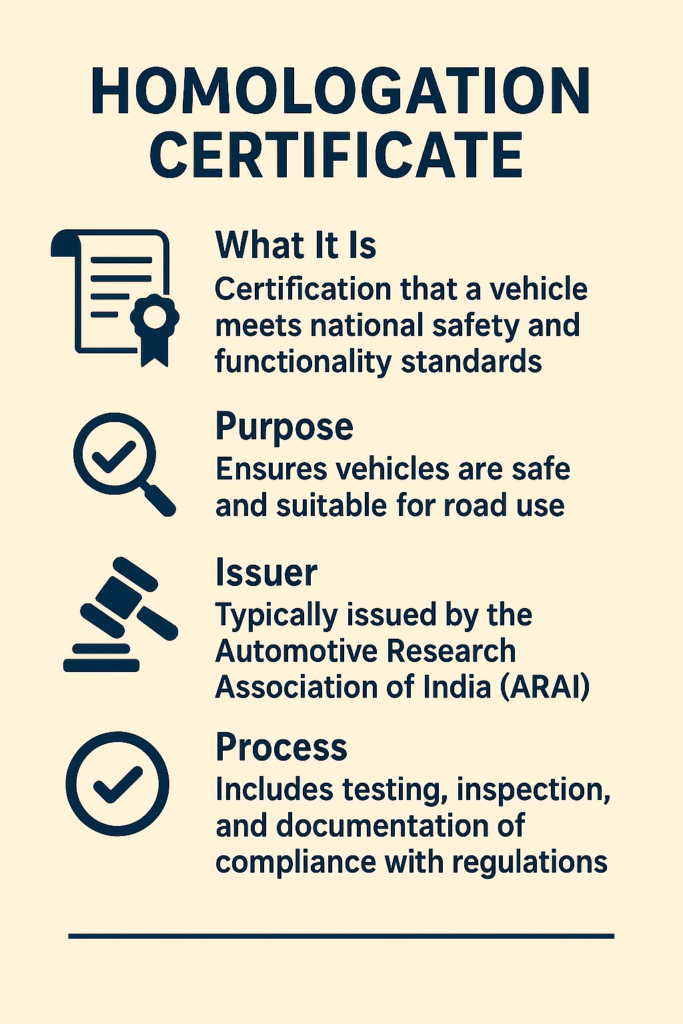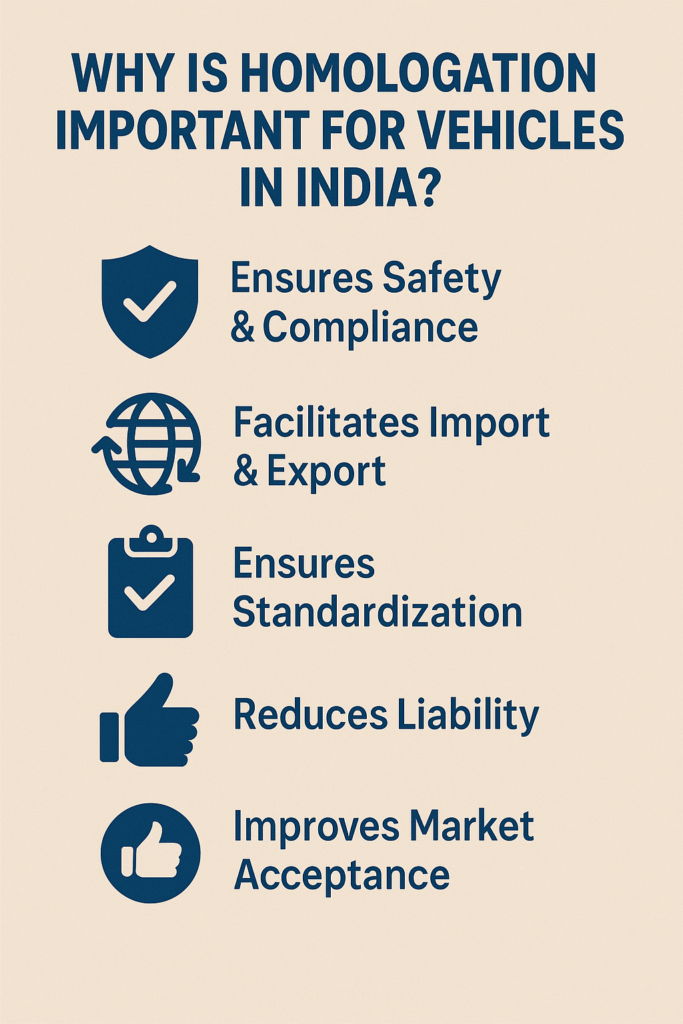Homologation Meaning & Homologation Certificate in India
If you’re into vehicles or transport services in India, you’ve probably heard the term homologation. But what exactly does homologation mean, and why is it so important? In simple terms, homologation is the process that ensures a vehicle meets all the safety, environmental, and technical standards set by Indian authorities before it can be sold or registered.
Along with that, a homologation certificate is the official proof that a vehicle or its parts comply with these standards. This certificate is mandatory for manufacturers, importers, and sometimes vehicle owners, especially when bringing in vehicles from abroad or modifying them.

Let’s break down the homologation meaning in detail and see how you can get a homologation certificate in India.
What is Homologation? (Homologation Meaning)
Homologation is the official approval process that certifies a vehicle or its components meet all necessary regulations, including safety, emissions, and roadworthiness standards. Without homologation, vehicles cannot be legally registered or driven on Indian roads.
This process ensures that vehicles are safe for drivers, passengers, and other road users, and that they comply with environmental laws to reduce pollution.
Why is Homologation Important for Vehicles in India?
Homologation isn’t just a fancy term it’s a big deal for anyone dealing with vehicles in India. Here’s why:

- Legal Compliance: Indian law requires homologation approval before any vehicle or vehicle part can be sold, registered, or used on the road. No homologation, no legal driving.
- Safety Assurance: It ensures the vehicle meets all safety standards, protecting drivers, passengers, and others on the road.
- Environmental Protection: Homologation includes checks for emission standards, helping reduce pollution and improve air quality.
- Import and Modification Control: If you import vehicles or modify existing ones, homologation certifies they still meet all legal requirements.
- Smooth Registration: Without homologation, getting your vehicle registered via Parivahan Sewa or RTO is impossible.
What is a Homologation Certificate?
A homologation certificate is the official document issued after a vehicle successfully passes the homologation process. It certifies that the vehicle complies with all Indian safety, emission, and technical standards.
This certificate is crucial for:
- Vehicle Registration: Without it, you can’t register your vehicle in India through Parivahan Sewa or the RTO.
- Legal Import: Imported vehicles must have a homologation certificate to be legally allowed on Indian roads.
- Modifications: If a vehicle is modified significantly, a new homologation certificate may be required to confirm compliance.
- Manufacturer Compliance: Vehicle manufacturers must secure homologation certificates before launching models in India.
In short, the homologation certificate is proof that your vehicle meets all required standards to be road-legal in India.
How to Get a Homologation Certificate in India
Getting a homologation certificate involves a formal process primarily handled by vehicle manufacturers, importers, or authorized testing agencies. Here’s how it works:
- Application Submission: The manufacturer or importer submits the vehicle details and technical documents to authorized agencies like the Automotive Research Association of India (ARAI) or International Centre for Automotive Technology (ICAT).
- Vehicle Testing: The vehicle undergoes comprehensive tests covering safety, emissions, noise, and other parameters as per Central Motor Vehicle Rules (CMVR).
- Document Verification: Agencies verify compliance documents and certifications.
- Compliance Confirmation: If the vehicle meets all criteria, the agency issues the homologation certificate.
- Distribution: The certificate is then used for vehicle registration with the RTO and Parivahan Sewa and for legal sale or import in India.
For individual vehicle owners, especially importing vehicles or modifying them, it’s best to consult with the manufacturer or an authorized testing agency to ensure homologation compliance.
Difference Between Homologation and Registration
People often mix up homologation and registration, but they’re quite different:
- Homologation is the process where a vehicle is tested and certified to meet all safety and emission standards before it can be legally sold or used in India. It’s about compliance at the manufacturing/import level.
- Registration is the official recording of the vehicle with the RTO/Parivahan Sewa, giving it a unique number plate and legal identity on Indian roads.
Think of homologation as getting your vehicle approved for the Indian market, while registration is about getting it officially listed so you can drive it.
Both are necessary steps, but they happen at different stages.
Homologation vs PUC: What’s the Difference?
These two terms pop up a lot in vehicle compliance, but they’re not the same thing:
- Homologation is the big-picture certification process that checks if a vehicle or its parts meet all Indian safety and emission standards before it hits the market. It’s about the vehicle’s design and manufacturing compliance.
- PUC (Pollution Under Control) Certificate is a periodic test your vehicle has to pass during its lifetime to prove it’s still running clean and within pollution limits on the road.
In simple terms:
Homologation is about approving the vehicle initially.
PUC is about monitoring ongoing emissions while you drive.
Both help keep roads safer and cleaner but apply at different points.
FAQs About Homologation and Homologation Certificate
Conclusion
Homologation and the homologation certificate play a critical role in ensuring vehicles comply with safety and environmental standards in India. This process protects drivers, passengers, and the environment by certifying that vehicles meet the necessary regulations before they are registered and allowed on the road. Whether you are a manufacturer, importer, or vehicle owner, understanding homologation helps you navigate compliance smoothly with the Parivahan Sewa portal and RTO authorities. Staying informed and certified keeps your vehicle legal and roadworthy.
